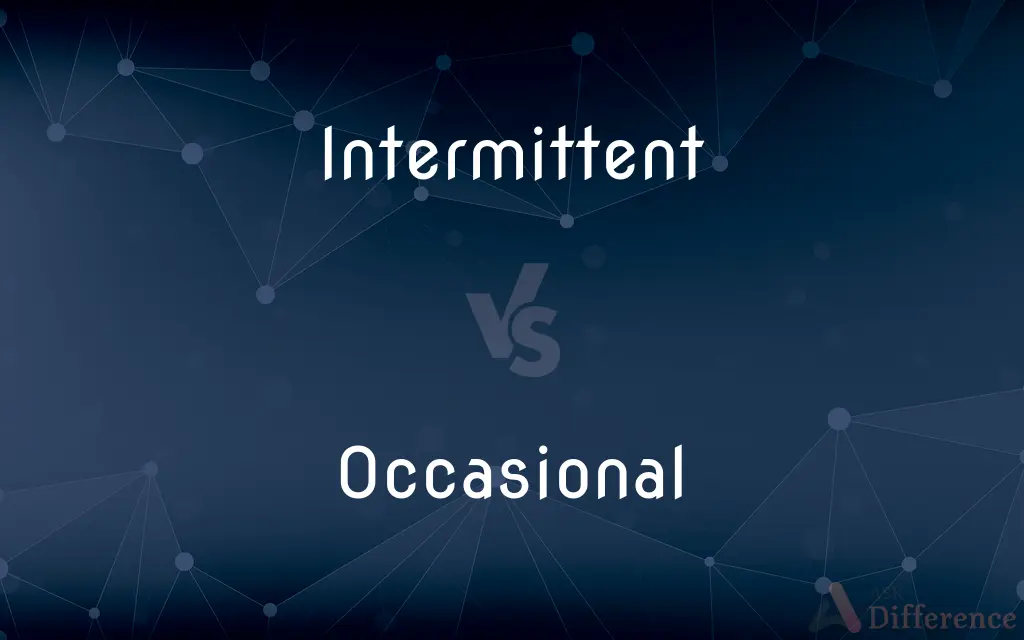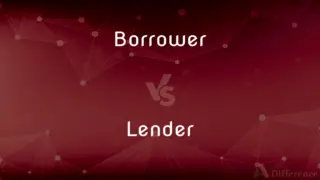Intermittent vs. Occasional — What's the Difference?
By Maham Liaqat & Urooj Arif — Updated on March 13, 2024
Intermittent refers to something occurring at irregular intervals or with occasional pauses, while occasional signifies something happening infrequently or at irregular times without a consistent pattern.

Difference Between Intermittent and Occasional
Table of Contents
ADVERTISEMENT
Key Differences
Intermittent events or actions are characterized by starting and stopping at irregular intervals, implying a certain level of frequency but with breaks in continuity. For example, intermittent rain involves periods of rainfall followed by periods without rain, suggesting a pattern that is not steady but recurs over a short term. Occasional, on the other hand, describes events or actions that happen from time to time but without a predictable pattern or frequency. An occasional meeting might happen every few months without a set schedule, indicating infrequency and a lack of regularity.
The concept of intermittence often carries the implication of more frequent occurrences than occasional events, which are marked by their rarity. Intermittent activities might be part of a cycle with expected pauses, whereas occasional activities occur with less predictability and are not typically part of a regular cycle. For instance, intermittent fasting involves cycles of eating and fasting over specific intervals, while occasional fasting might happen sporadically, without a defined schedule.
In terms of perception, intermittent can suggest a temporary or transitional state, with the expectation that the activity will resume after short pauses. In contrast, occasional suggests a more sporadic nature, with no expectation of immediate recurrence. This distinction is important in contexts such as work, where intermittent tasks may be part of a routine, albeit with breaks, while occasional tasks are outside the usual scope of activities.
Both terms serve to moderate the expectation of frequency, but they do so in different ways. Intermittent moderates by suggesting a pattern that is not constant, while occasional moderates by implying infrequency. Understanding the nuances between the two can aid in setting appropriate expectations for events, behaviors, or conditions in various contexts.
Comparison Chart
Frequency
Occurs at irregular intervals with breaks in continuity.
Happens infrequently without a predictable pattern.
ADVERTISEMENT
Predictability
May have a somewhat predictable cycle despite irregularities.
Lacks a regular pattern or cycle, making it unpredictable.
Implication of Frequency
Implies more frequent occurrences with expected pauses.
Suggests rarity or infrequency of occurrences.
Part of Cycle
Often part of a defined cycle with known pauses.
Not typically part of a regular cycle.
Perception
Suggests a temporary or transitional state with resumptions.
Implies a more sporadic nature without expectation of recurrence.
Compare with Definitions
Intermittent
Occurring at irregular intervals; not continuous.
Intermittent internet connectivity disrupted the online meeting.
Occasional
Happening from time to time; not regular.
He enjoys the occasional cup of coffee in the morning.
Intermittent
Partially or periodically halted.
Intermittent rain is expected throughout the afternoon.
Occasional
Not habitual; sporadic.
She takes occasional breaks from social media for mental health.
Intermittent
Marked by occasional breaks.
The doctor recommended intermittent walking breaks during long sitting periods.
Occasional
Not constant; happening now and then.
Occasional errors in the report were corrected.
Intermittent
Not steady or constant.
Intermittent noise from the construction site was distracting.
Occasional
Infrequent or irregular.
Occasional meetings are held to discuss progress.
Intermittent
Recurring with pauses.
She experienced intermittent symptoms over several weeks.
Occasional
Arising or occurring sporadically.
They encounter occasional wildlife on their hikes.
Intermittent
Occurring at irregular intervals; not continuous or steady
Intermittent rain
Occasional
Occurring, appearing, or done infrequently and irregularly
The occasional car went by but no taxis
Intermittent
Stopping and starting at intervals.
Occasional
Occurring, encountered, done, or taken from time to time; irregular or infrequent.
Intermittent
Alternately containing and empty of water
An intermittent lake.
Occasional
Created for a special occasion
Occasional verse.
Intermittent
Stopping and starting, occurring, or presenting at intervals; coming after a particular time span.
The day was cloudy with intermittent rain.
Intermittent bugs are most difficult to reproduce.
Occasional
Intended for use as the occasion requires
An occasional chair.
Intermittent
Existing only for certain seasons; that is, being dry for part of the year.
The area has many intermittent lakes and streams.
Occasional
Being a factor that makes something possible; being a cause of something.
Intermittent
An intermittent fever or disease.
Occasional
Acting in a specified capacity from time to time
An occasional hunter.
Intermittent
Coming and going at intervals; alternating; recurrent; periodic; as, an intermittent fever.
Occasional
Occurring or appearing irregularly from time to time, but not often.
He was mostly solitary, but enjoyed the occasional visitor.
He took an occasional glass of wine.
Intermittent
An intermittent fever or disease.
Occasional
Created for a specific occasion.
Elgar's music was not created to be occasional music for high-school graduations.
Intermittent
Stopping and starting at irregular intervals;
Intermittent rain showers
Occasional
Intended for use as the occasion requires.
What your living room needs are some occasional chairs.
Intermittent
Stopping and starting at regular intervals
Occasional
Acting in the indicated role from time to time.
He is an occasional writer of letters to the editor.
Occasional
A person who does something only occasionally.
Occasional
Occuring at times, but not constant, regular, or systematic; made or happening as opportunity requires or admits; casual; incidental; as, occasional remarks, or efforts.
The . . . occasional writing of the present times.
Occasional
Produced by accident; as, the occasional origin of a thing.
Occasional
Of or pertaining to an occasion or to occasions; intended for a specific occasion; for use only when needed, and not regularly.
Occasional
Occurring from time to time;
Took an occasional glass of wine
Occasional
Occurring or appearing at usually irregular intervals;
Episodic in his affections
Occasional headaches
Occasional
Employed in a specified capacity from time to time;
Casual employment
A casual correspondence with a former teacher
An occasional worker
Common Curiosities
Can something be both intermittent and occasional?
While they have different implications, in some contexts, an event or condition could be described as both, especially if it occurs with breaks and is also infrequent.
What does intermittent mean?
Intermittent refers to something occurring at irregular intervals with breaks in between, not continuous.
Are there intermittent diseases?
Yes, some diseases or conditions can manifest intermittently, showing symptoms at irregular intervals.
What does occasional mean?
Occasional signifies something happening infrequently or at irregular times, without a consistent pattern.
Is occasional synonymous with rare?
Occasional is similar to rare but typically implies slightly more frequent occurrences, though still infrequent.
Can intermittent events become occasional?
Yes, if the frequency of intermittent events decreases over time, they may be described as occasional.
Can weather be described as intermittent or occasional?
Yes, weather phenomena can be intermittent (like intermittent rain) or occasional (like occasional thunderstorms), depending on their nature and frequency.
How do you measure the frequency of intermittent or occasional events?
Intermittent events can be tracked over time to identify patterns, while occasional events may be noted as they occur due to their infrequent nature.
How do intermittent and occasional affect planning?
Intermittent events may require readiness for periodic occurrences, while occasional events necessitate flexibility due to their unpredictability.
How does intermittent differ from regular?
Intermittent implies irregularity and breaks, whereas regular suggests a consistent and continuous pattern.
Can a job be occasional or intermittent?
Yes, jobs can be described as either, depending on the nature and frequency of work; intermittent jobs might have regular breaks, while occasional jobs happen infrequently.
Do intermittent and occasional have the same impact on stress?
Intermittent events might cause more consistent stress due to their recurring nature, while occasional events might lead to sporadic stress spikes.
How do intermittent and occasional impact lifestyle?
Intermittent activities might require adjustments during active phases, while occasional activities may need less structured accommodation due to their infrequency.
How do intermittent and occasional preferences affect consumer behavior?
Consumers might tolerate intermittent issues with a product or service if they're minor or predictable, while occasional issues might influence satisfaction differently due to their unpredictability.
What's the role of intermittent and occasional in time management?
Effective time management involves accounting for intermittent tasks with known cycles and accommodating occasional tasks that arise unpredictably.
Share Your Discovery

Previous Comparison
Borrower vs. Lender
Next Comparison
Brawl vs. FightAuthor Spotlight
Written by
Maham LiaqatCo-written by
Urooj ArifUrooj is a skilled content writer at Ask Difference, known for her exceptional ability to simplify complex topics into engaging and informative content. With a passion for research and a flair for clear, concise writing, she consistently delivers articles that resonate with our diverse audience.















































